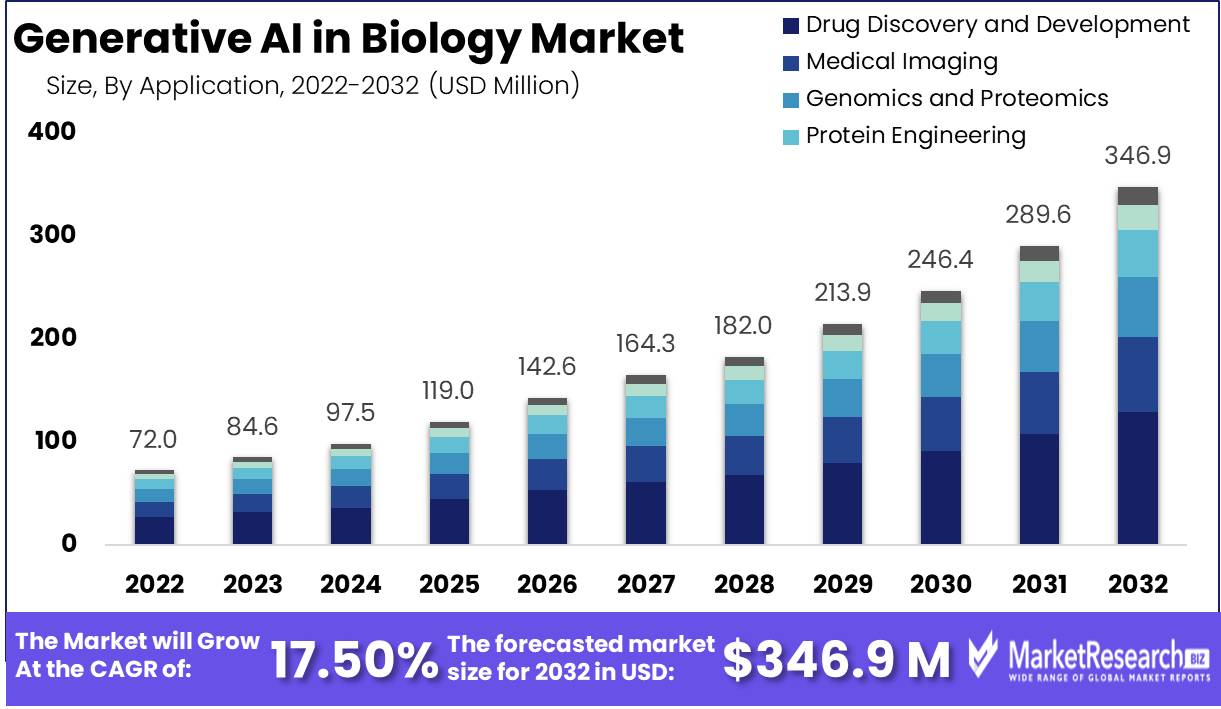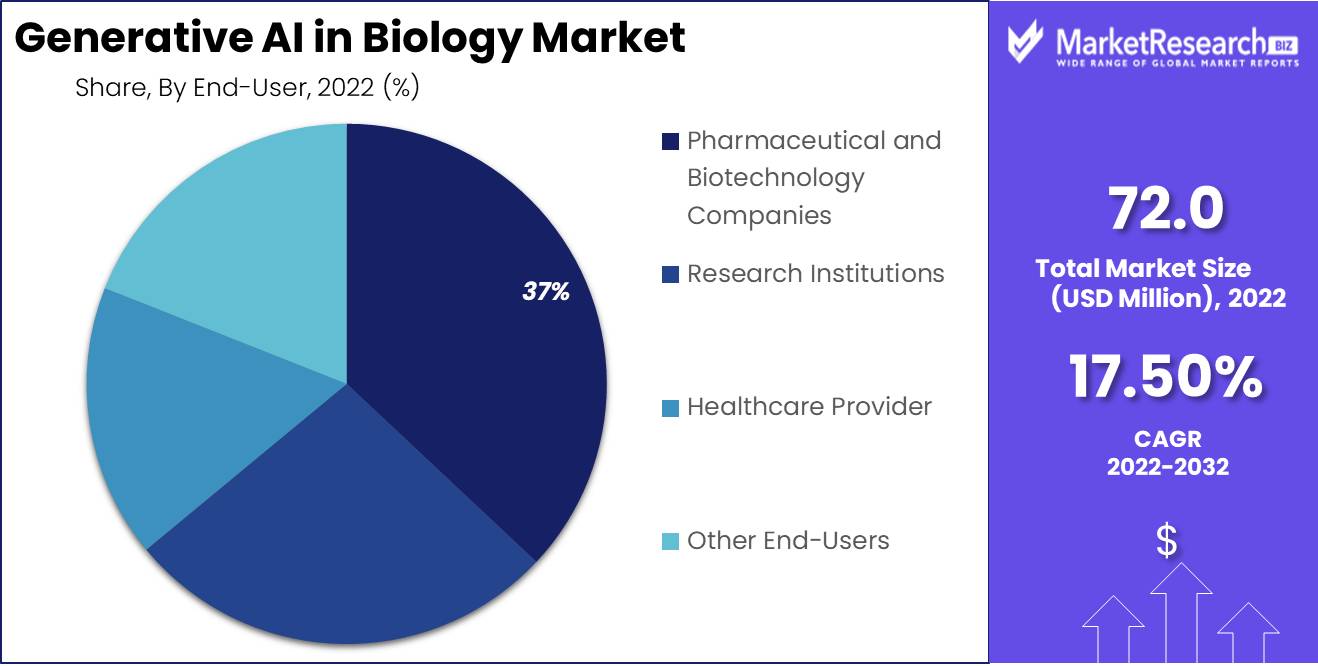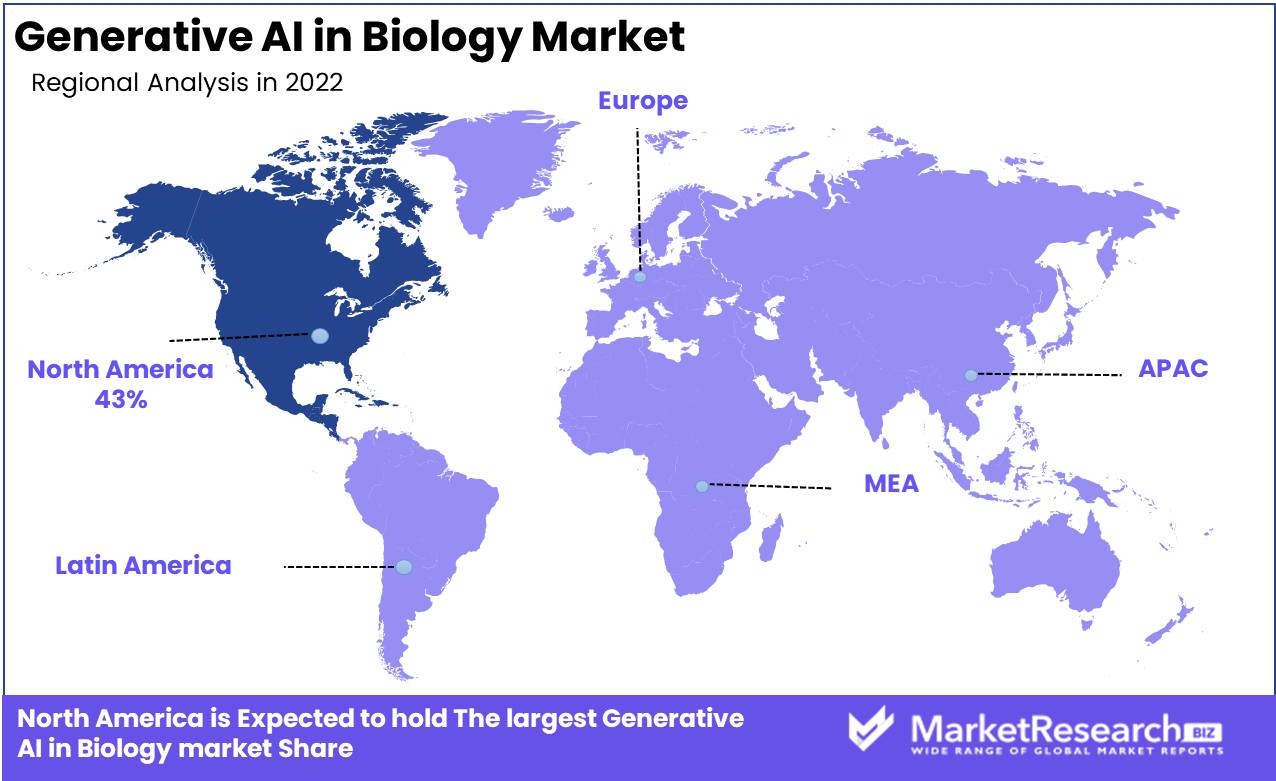
Global Generative AI in Biology Market, By Application (Medical Imaging, Genomics & Proteomics, and Other), By Technology (Generative Adversarial Networks, Variational Autoencoders, Other), By End-User, By Region and Companies - Industry Segment Outlook, Market Assessment, Competition Scenario, Trends, and Forecast 2023-2032
-
38017
-
June 2023
-
178
-
-
This report was compiled by Vishwa Gaul Vishwa is an experienced market research and consulting professional with over 8 years of expertise in the ICT industry, contributing to over 700 reports across telecommunications, software, hardware, and digital solutions. Correspondence Team Lead- ICT Linkedin | Detailed Market research Methodology Our methodology involves a mix of primary research, including interviews with leading mental health experts, and secondary research from reputable medical journals and databases. View Detailed Methodology Page
-
Quick Navigation
- Report Overview
- Driving Factors
- Restraining Factors
- Generative AI in Biology Market Segmentation Analysis
- Key Market Segments
- Generative AI in Biology Market Growth Opportunities
- Generative AI in Biology Market Regional Analysis
- Generative AI in Biology Market Key Player Analysis
- Market Key Players
- Recent Development
- Report Scope
Report Overview
Global Generative AI in Biology Market size is expected to be worth around USD 346.9 million by 2032 from USD 72.0 million in 2022, growing at a CAGR of 17.50 %. during the forecast period from 2023 to 2032.

Generative artificial intelligence (AI) refers to machine learning models that can create novel, realistic artifacts rather than simply classify or predict. In biology, generative AI can produce synthetic biological data that retains the statistical properties of real biological data sets. This allows researchers to augment limited real-world data and investigate biological phenomena in silico.
Key applications include generating genome sequences, cellular images, protein structures, and simulated expressions of genes and proteins. Though promising, evaluative benchmarks are needed to ensure generative biology models produce artifacts with fidelity and utility for downstream biologists.
The Generative AI in Biology Market is being driven by several key factors. The vast amounts of biological data being generated through high-throughput experiments and testing are enabling new opportunities for applying generative AI models. As more data is accumulated, generative models can be better trained to produce novel and reliable biological insights.
MIT scientists have developed an open-source, automated machine-learning platform called BioAutoMATED to generate artificial intelligence (AI) models for biology research. The system aims to democratize AI for research labs by simplifying the process of building machine-learning models, particularly for those without extensive machine-learning expertise.
Moreover, major tech and pharmaceutical companies are partnering with AI startups to leverage generative models for drug discovery and development. For Instance, In August 2023, Ginkgo Bioworks entered into a partnership with Google Cloud to develop a generative AI platform for biology and biosecurity. The company emphasizes the importance of data as a crucial resource for powering machine learning applications in the field of biological development.
Additionally, the need for accelerated drug discovery and development is fueling demand for the Generative AI in Biology Market. Pharmaceutical companies are increasingly adopting these AI tools to help model protein folding, predict drug-target interactions, and simulate complex biological processes to streamline R&D pipelines. The ability to generate and prioritize higher-quality drug candidates earlier in development is a major appeal of Generative AI in the Biology Market.
In November 2023, Dutch-Swiss startup Cradle successfully raised €21.9 million in a Series A funding round, led by Index Ventures Cradle specializes in leveraging generative artificial intelligence (AI) for protein design and engineering in the field of biology. The projects encompass various protein modalities such as enzymes, vaccines, peptides, and antibodies, targeting properties like stability, expression, activity, binding affinity, and specificity.
Other drivers include the wider availability of cloud computing resources to run complex generative AI models, as well as a push for more predictive and personalized medicine. As healthcare continues trending toward precision and individualization, technologies like generative AI can help enable that future through biology-specific applications.
In June 2023, Pioneering a new frontier in AI-powered drug discovery, Enable Medicine has launched Generative Biological Search (GBS). This groundbreaking technology seamlessly integrates large language models, vast biological datasets, and scalable research workflows. By simplifying and enhancing data-driven exploration, GBS establishes a robust platform for rapid innovation that keeps pace with the lightning speed of progress in artificial intelligence.
With multiple strong driving factors, the Generative AI in Biology Market is poised for robust growth in the coming years as generative AI capabilities continue advancing.
Driving Factors
Biomarker Discovery Fuels Generative AI Advancements in Biology
The rising emphasis on biomarker discovery is significantly contributing to the growth of generative AI in the biology market. Biomarkers are vital for understanding complex biological processes and diseases, and their identification is crucial for developing targeted therapies. Generative AI accelerates this discovery process by analyzing vast biological datasets to identify potential biomarkers more efficiently than traditional methods.
This capability is particularly important in personalized medicine, where understanding individual variations is key. The increasing focus on biomarker discovery in research and clinical settings indicates a sustained demand for generative AI solutions in biology, promising continued market growth driven by the need for more precise and personalized healthcare solutions.
Computational Power and Infrastructure Drive Generative AI in Biology
The availability of computational power and advanced infrastructure is a primary driver of growth for generative AI in biology. The exponential increase in computational capabilities has enabled the handling of complex biological datasets, allowing for more sophisticated AI models that can generate novel biological insights.
This infrastructure is crucial for training and running advanced AI algorithms capable of simulating and predicting biological processes. The continuing advancements in computational power and infrastructure are expected to further boost the generative AI market in biology, facilitating more comprehensive and accurate biological analyses and innovations.
Drug Discovery and Development Propel Generative AI in Life Sciences
The emphasis on drug discovery and development is a key driving factor for the generative AI in life sciences market. The pharmaceutical industry's need for faster, more efficient drug development processes is well-aligned with the capabilities of generative AI.
These AI systems can rapidly analyze complex biochemical interactions and predict the efficacy and safety of potential drug compounds, significantly reducing the time and cost associated with drug development. This capability is invaluable in the current fast-paced, innovation-driven pharmaceutical environment. The ongoing demand for new and effective therapeutics suggests a sustained growth trajectory for generative AI in life sciences, particularly in streamlining the drug discovery and development process.
Restraining Factors
Data Security and Privacy Concerns Restrain Generative AI in Biology Market Growth
The growth of generative AI in the field of biology is significantly restrained by concerns related to data security and privacy. This is particularly pertinent in sensitive areas like healthcare and pharmaceuticals, where the handling of confidential patient data and proprietary research information is involved.
The risk of data breaches and unauthorized access to sensitive information raises serious concerns about adopting AI technologies. Ensuring compliance with stringent regulations like HIPAA in healthcare further complicates AI implementation. These security and privacy concerns can hinder the willingness of organizations to integrate generative AI into their operations, thereby limiting market expansion.
Quality and Reliability of Data from Generative AI Models Limit Market Growth
The quality and reliability of data generated by generative AI models are potential restraining factors in their application in biology, especially in critical areas such as drug discovery and medical imaging. The accuracy of generative AI outputs is crucial, as erroneous or unreliable data can lead to incorrect conclusions or decisions, particularly in high-stakes fields like medicine and pharmaceutical research.
Ensuring that generative AI models are trained on high-quality, comprehensive datasets and validating their outputs against real-world results is essential but challenging. Concerns about the fidelity and trustworthiness of AI-generated data can thus limit the adoption of these technologies in sensitive and critical biological applications.
Generative AI in Biology Market Segmentation Analysis
By Application
Generative AI's most significant impact in biology is in drug discovery and development. This dominance is driven by AI's ability to analyze vast datasets, identify novel drug candidates, predict drug-target interactions, and optimize drug design processes. AI accelerates the traditionally lengthy and costly drug development cycle, enabling quicker introduction of effective drugs to the market. Companies are leveraging AI to improve the efficiency of clinical trials, enhance precision medicine, and reduce the failure rate of drug candidates. The integration of generative AI in drug discovery is revolutionizing how pharmaceutical companies approach R&D, making this segment pivotal in the field.
Generative AI in medical imaging aids in diagnosis and treatment planning. In genomics and proteomics, AI enhances the understanding of complex biological data. AI in protein engineering is critical for developing new biological products. Synthetic biology benefits from AI in designing and engineering biological systems.
By Technology
Generative Adversarial Networks (GANs) are leading in generative AI technologies in biology, primarily due to their ability to create highly accurate and realistic synthetic biological data. This technology is instrumental in drug design, where it generates novel molecular structures, thereby accelerating the discovery of potential drug candidates. GANs' capacity to model complex biological processes makes them invaluable in research and development, significantly enhancing the predictive power of biological models.
Variational autoencoders are used for modeling and interpreting complex datasets, offering a robust framework for understanding biological variability and disease progression. Reinforcement learning is vital in optimizing therapeutic strategies and adaptive systems, particularly in personalizing treatment protocols. Other emerging technologies contribute to the diversification and enhancement of AI applications in biology, widening the scope of potential innovations and applications in the field.
By End-Use
The pharmaceutical industry is the primary end-user of generative AI in biology. These companies use AI to innovate in drug discovery, reduce R&D costs, and speed up time-to-market for new therapies, significantly impacting the efficiency and effectiveness of drug development processes. AI's predictive capabilities are leveraged for identifying new drug targets and understanding disease mechanisms, offering novel insights into complex biological systems.
Healthcare providers use AI for precision medicine and diagnostic purposes, tailoring treatments to individual patients' genetic and clinical profiles. Research institutions utilize AI for biological research, advancing knowledge in various biological fields, and fostering interdisciplinary collaborations that push the boundaries of biological understanding.

Key Market Segments
Based On Application
- Medical Imaging
- Genomics and Proteomics
- Drug Discovery and Development
- Protein Engineering
- Synthetic Biology
- Other Applications
Based On Technology
- Generative Adversarial Networks
- Variational Autoencoders
- Reinforcement Learning
- Other Technologies
Based On End-User
- Pharmaceutical and Biotechnology Companies
- Research Institutions
- Healthcare Provider
- Other End-Users
Generative AI in Biology Market Growth Opportunities
Demand for Precision Medicine Drives Growth in Generative AI in Biology Market
The rising demand for precision medicine is a key factor driving the growth of generative AI in the biology market. Precision medicine relies heavily on the ability to analyze complex biological data and derive personalized treatment strategies.
Generative AI plays a crucial role in this process by enabling the analysis and interpretation of vast amounts of genomic and clinical data at an unprecedented scale and speed. This technology's ability to identify patterns and predict outcomes is transforming how treatments are tailored to individual patients, indicating a significant expansion potential within the precision medicine sphere.
Large Healthcare Datasets Fuel Growth in Generative AI in Healthcare Market
The increasing availability of large healthcare datasets is significantly contributing to the growth of generative AI in the healthcare market. The abundance of data, including genomic information, clinical trial data, and electronic health records, provides a rich resource for generative AI algorithms.
These algorithms can analyze complex datasets to uncover insights, predict disease progression, and optimize treatment protocols. The growing volume of healthcare data, coupled with advancements in AI technology, is enhancing the capacity for deep, actionable insights in healthcare, signaling robust market growth opportunities in areas such as disease prediction, drug discovery, and personalized treatment planning.
Generative AI in Biology Market Regional Analysis
North America Dominates with 37.50% Market Share
North America's leading 37.50% share in the Generative AI in Biology Market is primarily driven by the region's cutting-edge technological advancements and robust investment in AI and biotechnology. The United States, in particular, is home to numerous tech giants and innovative startups focused on integrating AI into biological research. High levels of funding from both government and private sectors for AI-driven biological research contribute significantly to this market dominance.

The market dynamics in North America are influenced by strong collaborations between tech companies, academic institutions, and biotech firms, fostering innovation in AI applications in biology. The region's advanced research infrastructure and the growing emphasis on personalized medicine and drug discovery also drive the demand for generative AI. Furthermore, the presence of a highly skilled workforce specializing in AI, data science, and biological sciences enhances the region's capacity for pioneering work in this field.
Europe Is A Hub for Research and Innovation
Europe’s generative AI in biology market is driven by its strong research infrastructure and focus on innovation. The region's emphasis on collaborative research, supported by various EU-funded programs, fosters the development of AI applications in biology. European countries are also leading in ethical AI research, ensuring responsible and sustainable development in this field.
Asia-Pacific's Rapid Technological Growth and Investment
In Asia-Pacific, the generative AI in biology market is expanding rapidly, fueled by increasing investments in AI and biotechnology sectors. Countries like China, Japan, and South Korea are investing heavily in AI research and development, focusing on its application in healthcare and biological sciences. The region's fast-growing tech industry and its efforts to advance in high-tech sectors position Asia-Pacific as a key emerging player in the global generative AI in biology market.
Generative AI in Biology Industry By Region
North America
- The US
- Canada
Europe
- Germany
- France
- The UK
- Spain
- Italy
- Russia
- Netherlands
- Rest of Europe
Asia-Pacific
- China
- Japan
- South Korea
- India
- New Zealand
- Singapore
- Thailand
- Vietnam
- Rest of Asia Pacific
Latin America
- Brazil
- Mexico
- Rest of Latin America
Middle East & Africa
- South Africa
- Saudi Arabia
- UAE
- Rest of the Middle East & Africa
Generative AI in Biology Market Key Player Analysis
In the rapidly emerging Generative AI in Biology Market, the companies listed are at the forefront of integrating artificial intelligence with biological research and drug discovery. Insilico Medicine, specializing in AI-driven drug discovery and development, leads the market with its innovative approach to identifying novel biological targets and molecules, demonstrating the significant potential of AI in accelerating and enhancing pharmaceutical research.
IBM Corporation, with its vast expertise in AI and machine learning, contributes significantly to the market through its advanced analytics and computational capabilities. These are crucial for processing complex biological data, thus enabling deeper insights into biological processes and drug interactions.
AiCure LLC, focusing on AI in patient monitoring and medication adherence, showcases the application of generative AI in enhancing patient care and treatment efficacy. Their technology represents a key shift towards more personalized and efficient healthcare solutions.
MosaicML, although a newer player, is carving out a niche in the market by optimizing machine learning models for biological data. Their work underscores the importance of tailored AI solutions in handling the unique challenges and complexities of biological research.
NVIDIA, known for its powerful GPUs and AI platforms, plays a critical role in providing the necessary computational power and infrastructure for AI applications in biology. Their technology enables the handling of vast datasets and complex computational tasks, which are integral to AI-driven biological research.
Collectively, these companies not only drive innovation in the Generative AI in Biology Market but also represent a range of strategies – from drug discovery and patient care to computational infrastructure – crucial for the advancement of AI applications in the field of biology.
Market Key Players
- NVIDIA Corporation
- IBM Corporation
- BenevolentAI
- DeepMind Technologies Limited
- Insilico Medicine
- Recursion Pharmaceuticals
- Zymergen
- Other Key Players
Recent Development
- Feb 2024 Successfully dosed the first patient in the study of GB-0895, an anti-TSLP monoclonal antibody for the treatment of mild-to-moderate asthma, in the United Kingdom. The primary endpoint of the study, which will also be conducted in Germany, aims to evaluate the safety and tolerability of GB-0895 for subcutaneous administration – with the goal of selecting 1–2 doses/regimens to advance in development.
- Nov 2023 Koninklijke Philips N.V., (Netherlands) collaborated with Vestre Viken Health Trust in Norway, deploying its AI Manager platform to enhance radiology workflows. The AI-enabled bone fracture application streamlined diagnoses, allowing radiologists to focus on complex cases. This initiative, spanning 30 hospitals and serving around 3.8 million people, marked Philips' most extensive AI deployment in Europe, contributing to improved patient care and accelerated diagnostic processes.
- Jun 2023: For processing various data sets, Insilico has introduced a new multimodal transformer-based aging clock.
Report Scope
Report Features Description Market Value (2022) USD 72.0 Mn Forecast Revenue (2032) USD 346.9 Mn CAGR (2023-2032) 17.50% Base Year for Estimation 2022 Historic Period 2016-2022 Forecast Period 2023-2032 Report Coverage Revenue Forecast, Market Dynamics, COVID-19 Impact, Competitive Landscape, Recent Developments Segments Covered By Application, By Technology, By End-Users Regional Analysis North America - The US, Canada, Europe - Germany, France, The UK, Spain, Italy, Russia, Netherlands, Rest of Europe, Asia-Pacific - China, Japan, South Korea, India, New Zealand, Singapore, Thailand, Vietnam, Rest of Asia Pacific, Latin America - Brazil, Mexico, Rest of Latin America, Middle East & Africa - South Africa, Saudi Arabia, UAE, Rest of Middle East & Africa Competitive Landscape NVIDIA Corporation, IBM Corporation, BenevolentAI, DeepMind Technologies Limited, Insilico Medicine, Recursion Pharmaceuticals, Zymergen, and Other Key Players Customization Scope Customization for segments, region/country-level will be provided. Moreover, additional customization can be done based on the requirements. Purchase Options We have three licenses to opt for: Single User License, Multi-User License (Up to 5 Users), Corporate Use License (Unlimited User and Printable PDF) -
-
- NVIDIA Corporation
- IBM Corporation
- BenevolentAI
- DeepMind Technologies Limited
- Insilico Medicine
- Recursion Pharmaceuticals
- Zymergen
- Other Key Players




